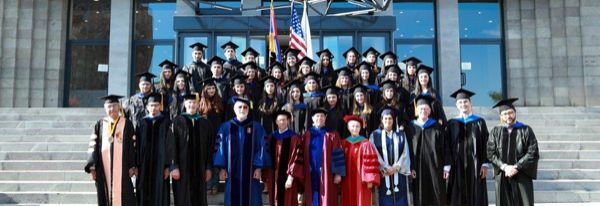
Summer Activities of the PSIA Program
4 min readOver the summer, members of the American University of Armenia’s (AUA) Political Science and International Affairs program were active in academia. Program Chair Dr. Simon Clarke attended the annual Meeting on Ethics and Political Philosophy at the University of Minho (Braga, Portugal) in June where he presented a paper entitled Would Mandatory Vaccination be a Violation of Individual Rights?, which argues that compulsory vaccination policies do not conflict with respect for individual rights. He was also chairperson of a panel on the history of political thought which discussed the ideas of John Locke and Jean-Jacques Rousseau.
In May, Dr. Don Fuller attended the 24th Annual Conference of the Network of Institutes and Schools of Public Administration in Central and Eastern Europe (NISPAcee) in Zagreb, Croatia. There he presented a paper called Automation; Robots: Crisis or Opportunity. The paper addressed several questions including the threat of technological unemployment, the possibility of engineers outmaneuver social scientists and artificial intelligence potentially surpassing humans, as well as many more interesting topics. Fuller concludes that technological challenges to humans will increase job complexity, reduce routinization, and leave the uneducated in trouble. Dr. Fuller is spending the Fall Semester 2016 as a visiting professor at the Anglo-American University in Prague but will return to AUA in January 2017.
Outgoing director of AUA’s Extension Program Dr. Arpie Balian joined PSIA as a full-time faculty member in September. In the summer, she was invited to participate in the EU Black Sea Basin cooperation conference in Constanta, Romania where she presented a program on education in regional tourism. In June, Dr. Balian participated in a Symposium dedicated to presenting the results from the project on ‘Strengthening the Livelihoods and Voice of the Poor and Vulnerable Persons in Armenia’ including the Summative Evaluation conducted by a PSIA student team led by Dr. Balian. This three-year project implemented by Mission Armenia was funded by the World Bank and Japan Social Development Fund and aimed at improving the employability and quality of life of the handicapped and vulnerable.
Dr. Yevgenya Paturyan presented her paper Armenian NGOs and Civic Activists: Seeing Eye to Eye? at two conferences, the 12th International Conference of the International Society for Third Sector Research in Stockholm, Sweden and the 24th World Congress of Political Science organized by the International Political Science Association in Poznan, Poland. The paper highlights some of the findings of the two-year research project currently underway in the Turpanjian Center for Policy Analysis (TCPA), looking at patterns of interaction between NGOs and civic activists in five protest campaigns in Armenia from 2008 to 2015, using case studies and interviews with key participants.
Along with co-author and TCPA Research Associate Valentina Gevorgyan, Dr. Paturyan also published a book chapter “Volunteering in Armenia: Leaving the Soviet Legacy Behind?” in Perspectives on Volunteering Voices from the South published by Springer. The chapter is based on some of the results of the two-year project and explores the patterns and realities of volunteering in Armenia, focusing on generational change and on motivations to volunteer. This is the first book to look at the volunteering experience in the global South, including countries from Africa and South America, as well as Mexico, Turkey, and China.
After returning from his sabbatical at Duke University in the USA during Spring 2016, Dr. Vahram Ter-Matevosyan published two articles in international peer-reviewed journals, The Kars-Akhalkalaki railway project: why Armenia should revisit its position in Turkish Review and Track Two Diplomacy between Armenia and Turkey: Achievements and Limitations in Caucasus Analytical Digest. A third article, Institutions and Identity Politics in the Armenian Diaspora: The Case Study of Russia and Lebanon is forthcoming in Diaspora Studies (co-authored with H. Danielyan and three AUA graduates).
Recipient of an AUA faculty research grant, Dr. Hovhannes Nikoghosyan, began his project to examine foreign policy decision-making. He also participated in the conference Changing Geopolitics of the Caucasus Region in Tbilisi, Georgia organized by the Carnegie Endowment for International Peace (Washington, DC). His talk was about economic, political, and societal trends in the Caucasus region. He also had several publications about the Nagorno-Karabakh situation in online magazines Russia Direct and Russian International Affairs.
Recent graduates of the program were also active over the summer. Five PSIA graduates, Tatevik Manukyan, Arevik Kamalyan, Lilit Ghazaryan, Albert Hayrapetyan, and Julieta Avetisyan participated in the Institute for Law and Policy Program at the Hebrew University of Jerusalem in early July. Ani Davtyan received a scholarship to participate in the Genocide and Human Rights Program organized by Zoryan Institute in Toronto, Canada. She was also involved in an internship program in social protection at UNICEF Armenia. Maria Nersisyan started an internship at UN Development Program and UN Industrial Development Organization this summer and tells us that the skills she acquired in PSIA help her handle the hardest tasks from her supervisors. Liana Sahakyan started work as an evaluation research assistant for a Council of Europe project ‘Support to Consolidating Local Democracy in Armenia’. Anna Hakobyan participated in a summer school program on ‘Intergroup conflict and its resolution – the case of Ukraine’ in Bremen, Germany which was fully funded by the German Academic Exchange Service and the German Federal Foreign Office. Other PSIA graduates of 2016 were also active in seeking employment and volunteering for NGOs. Siranush Harutyunyan is writing a report on the prevention of selective abortions in Armenia for the International Center for Human Development which is a nongovernmental, nonprofit research, and public policy institution.
The projects and activities of PSIA faculty and students continue to flourish and grow from strength-to-strength. As we enter the new academic year, these and other activities will expand and develop. More information about the program can be found on its webpage http://psia.aua.am/.
